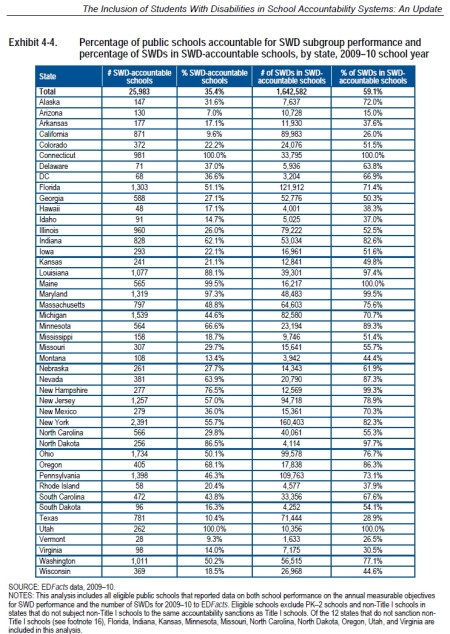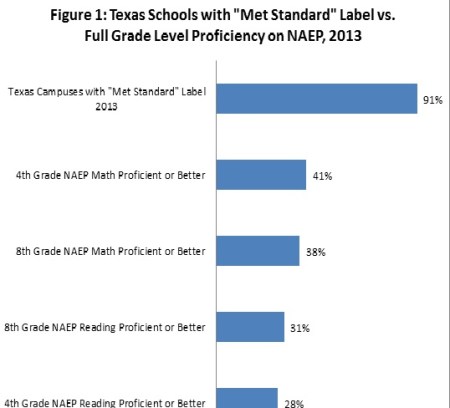(Guest Post by Matthew Ladner)
Is there much at stake in the fight over academic standards? Studies from no less than Hanushek and Loveless basically show that the standards movement has largely been pushing on a string. There is some evidence that suggests that states that were doing absolutely nothing on testing before NCLB saw above average math gains, but the fact is most states were testing before NCLB, the gains may have been a one time step increase, and evidence linking the quality of standards and/or tests to academic gains is in short supply.
NCLB’s attempt to test the nation’s kids to 100% proficiency (or as Andy Rotherham insists something more like close to it if you read the fine print, which few outside of Andy did) by a date certain ended in tears waivers.
My impression is that the standards movement basically hangs its hat on the Massachusetts experience. Massachusetts has the highest NAEP scores and thus is a good example to study. Massachusetts however introduced a multifaceted reform strategy in the early 1990s, but scholars seem remarkably incurious about which policy changes helped to drive how much improvement. Of course, like the Florida experience, we can never know what policy changes drove aggregate level improvements, but we have a great deal of micro-level evidence on the impact of individual policies. If any of this exists for Massachusetts, I’ve not seen it discussed. Even if we did have a good sense of this based upon a large body of studies, the question of external validity must be considered. Last time I checked MA was one of four states with an average family income for a family of four in the six figures and I’d wager draws an unusually high number of teachers from selective universities.
Why has the standards movement been pushing on a string? No it is not just that states set the test cut scores at incredibly low levels, although they did that:

It’s not just that states held a repulsive 35% of schools responsible for the scores of their special education kids scores in 2009-10, although they did just that:

After all of those things and others most states took the further step of obscuring the results behind a set of fuzzy labels, like Texas:

Some states have pulled this off much better than others, and a high quality system of transparency should be every policymakers goal. The idea that the country has meaningful, widespread “accountability” through state testing is a demonstrably simplistic notion. The greatest trick the devil ever pulled was conflating minimal skills testing in math and reading with robust accountability. While this is obviously absurd given a moment or two of reflection, it is also deeply ingrained in people’s thinking that you can do things like show a legislative committee a chart like the one immediately above, only to have a member of that committee berate you a mere few minutes later that private schools “lack accountability.”
Er, lack accountability compared to what? I may have missed it but I’m putting the number of people in Texas having been held responsible for the state’s 28% reading proficiency rate over/under at zero unless you want to blame it on the kids themselves, most of whom have been labeled “proficient” on state tests that the Wall Street Stock Picking Chicken might pass on a good day (see Figure 1).
Well yes, but the Common Core will fix all of this. Except of course it won’t. If you’ve been paying attention, you may have noticed that states all over the place have been adopting their own tests and cut scores and discussing withdrawing all together. Meet the new boss, same as the old boss?
The current chaos shares an origin with the wrecking of the NCLB-era state tests. It is the same reason your tax dollars get used to pay farmers not to grow food so that you can pay higher grocery bills. Agribusiness is organized and politically active, while eaters are disorganized and politically inactive. Organized/active beats disorganized/inactive 99 times out of a 100.
So in theory, the state sets out grade level academic standards, and then tests children against those standards. Schools thereby follow a coherent flow of content such that you do simple addition before complex addition etc. In theory teachers and schools that fail to teach the standards get held accountable. In theory, there is no unauthorized breeding on Jurassic Park, but…

As long as you are going to have academic standards and tests, you ought to fight not to have horribly deceptive systems. You should rather fight for informative tests and clear labels, but with the full knowledge that the dinosaurs on your island will constantly be breaking out of your fences in any number of ways. They may even convince some people in the leafy suburbs that the substitution of one set of standards and tests for another constitutes oppression, er, somehow…how? I’m not entirely sure but…ah…stick it to THE MAN!

Bureaucratic accountability, in short, will always face severe political limitations, and even under the best of circumstances is no substitute for parents possessing an exit option. Even under the best theoretical systems there will always be kids who would be better off somewhere else for both academic and non-academic reasons. Decentralized accountability works best with transparency to inform choices, but centralized accountability without choice will inevitably face the gravity well of regulatory capture.
The level of control you are attempting is not possible.

We’re sorry, the level of control you are attempting is not possible at this time. Please try again after human nature has been remade.